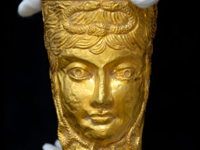Treasure Hunt in England Led to Revision of History
An amateur treasure hunter prowling English farmland with a metal detector stumbled upon the largest Anglo-Saxon treasure ever discovered, a massive collection of gold and silver crosses, sword decorations and other items, British archaeologists reported Thursday.

One expert said the treasure would revolutionize understanding of the Anglo-Saxons, a Germanic people who ruled England from the fifth century until the Norman conquest in 1066. Another said the find would rank among Britain's best-known historic treasures.
"This is just a fantastic find completely out of the blue," Roger Bland, who managed the cache's excavation, said in a statement. "It will make us rethink the Dark Ages."
Leslie Webster, the former curator of Anglo-Saxon archeology at the British Museum, said the amount of gold uncovered — about 11 pounds (5 kilograms) — suggested that early medieval England was a far wealthier place than previously believed.
She also said the crosses and other religious artifacts mixed in with the mainly military items might shed new light on the relationship between Christianity and warfare among the Anglo-Saxons.
The seventh-century hoard found by 55-year-old Terry Herbert in western England, consists of about 1,500 pieces of gold and silver, mostly weapons and other military artifacts, some inlaid with precious stones. Experts say the finely crafted pieces could have belonged to Anglo-Saxon royalty.
Herbert, from the town of Burntwood, found the gold on a friend's farm on July 5 and spent the next five days scouring the field for the rest of the hoard.
Herbert recovered the first items before professional archaelogists took over the excavation.
"Imagine you're at home and somebody keeps putting money through your letterbox, that was what it was like," Herbert said. "I was going to bed and in my sleep I was seeing gold items."
The hoard was officially declared treasure by a coroner, which means it will now be valued by a committee of experts and offered up for sale to a museum. Proceeds would be split 50-50 between Herbert and his farmer friend, who has not been identified. The find's exact location is being kept secret to deter looters.
Bland said he could not give a precise figure for the worth of the hoard, but he said the treasure hunter could be in line for a "seven-figure sum."
Herbert said the experience had been "more fun than winning the lottery," adding that one expert likened his discovery to finding Tutankhamen's tomb.
"I just flushed all over when he said that. The hairs on the back of my neck stood up," Herbert said.
The hoard is in storage at the Birmingham Museum and Art Gallery. Some of the items are due to go on display starting Friday.
The Associated Press contributed to the report.
Subscribe to Pravda.Ru Telegram channel, Facebook, RSS!


